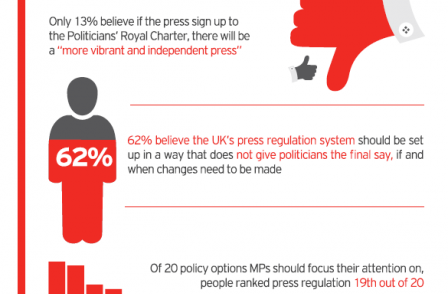
The publisher-backed Free Speech Network said a new poll published today shows that the public “overwhelmingly believes that politicians would exploit their own plans for press regulation to dampen criticism of them”.
It also found that when it comes to the public’s political priorities, press regulation came 19th out of 20 policy areas – with only constitutional reform ranking lower.
It is now nearly two weeks since the Coalition Government published its final plan for a Royal Charter to regulate the press.
While the main newspaper and magazine trade bodies have yet to release a formal response to the plan, this latest survey will provide forther ammunition for those who are resistant to political involvement in press regulation.
The key concern from publishers apears to lie with the fact that the Royal Charter, which is due to go to the Privy Council for approval at the end of this month, sets out a system of press regulation which can be changed in future with a two-thirds majority of both Houses of Parliament.
The Survation poll of just over 1,000 people moots a new system of press self-regulation which would be overseen by a charity rather than the a Royal Charter-backed recognition body. It found evidence if public support for such a plan and for the contract-backed system of press regulation which has been put forward by publishers under the Independent Press Standards Organisation:
Thinking about how the press should be regulated in the future, what kind of regulatory body would you prefer to see regulate newspapers and the press?
A regulator, overseen by a Royal Charter, with rules agreed by politicians: 20 per cent
A regulator overseen through legal contracts, binding on the media industry with rules agreed by their publishers: 38 per cent
Neither: 20 per cent
Don’t know: 23 per cent
Which if the following statements is closest to your opinion?
The new press regulation system should be set up in a way that gives politicians the final say if and when changes need to be made: 18 per cent
The new regulation system should be set up in way that does not give politicians the final say if and when changes need to be made: 62 per cent
Don’t know: 21 per cent
An alternative to using a Royal Charter to supervise press regulation would be to set up a Charitable Trust This is a body set up with a public benefit and charitable purpose, which is jointly supervised by the High Court and the Charity Commission. Which mechanism do you think would be best for settng up a new body to supervise a press regulator?
A Royal Charter written and under the control of politicians: 13.2 per cent
A Charitable Trust set up under the supervision of the Charity Commission and the High Court: 65 per cent
Don’t know: 22 per cent
Asked whether the new proposed Royal Charter system of press regulation will be used by politicians to prevent criticism, some 68 per cent said that was a high or moderate risk of this happening.
But when it comes the financial penalties proposed for publishers who don’t sign up to a Royal Charter-backed press regulator (the risk of exemplary damages in courts cases) the public appears to be split:
Under the current Royal Charter, drawn up by the political parties and the Hacked Off lobby group, newspapers and magazines will face heavy financial penalties in any future court cases, unless they agree to all the rules proposed in the Royal Charter. Do you think this will?
Result in a more vibrant and independent press: 13.2 per cent
Result in a less vibrant and independent press: 39 per cent
Have no effect on the independence and vibrancy of the press: 30.1 per cent
Don’t know: 17.2 per cent
Asked whether what is most important, that the regulator is independent of politicians or editors, 50 per cent said politicians, 35 per cent editors and 15 per cent were don’t knows.
Infographic from the Free Speech Network:

Email pged@pressgazette.co.uk to point out mistakes, provide story tips or send in a letter for publication on our "Letters Page" blog
